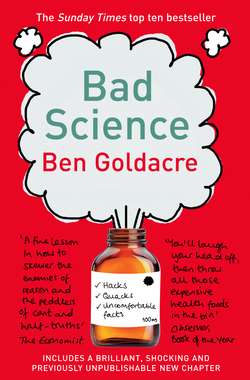Читать книгу Bad Science - Ben Goldacre - Страница 11
If it’s not science, what is it?
ОглавлениеFind out if drinking urine, balancing on mountain ledges and genital weightlifting really did change their lives forever.
Channel 4’s Extreme Celebrity Detox
These are the absurd extremes of detox, but they speak of the larger market, the antioxidant pills, the potions, the books, the juices, the five-day ‘programmes’, the pipes up the bum and the dreary TV shows, all of which we will torpedo, mostly in a later chapter on nutritionism. But there is something important happening here, with detox, and I don’t think it’s enough just to say, ‘All this is nonsense.’
The detox phenomenon is interesting because it represents one of the most grandiose innovations of marketers, lifestyle gurus, and alternative therapists: the invention of a whole new physiological process. In terms of basic human biochemistry, detox is a meaningless concept. It doesn’t cleave nature at the joints. There is nothing on the ‘detox system’ in a medical textbook. That burgers and beer can have negative effects on your body is certainly true, for a number of reasons; but the notion that they leave a specific residue, which can be extruded by a specific process, a physiological system called detox, is a marketing invention.
If you look at a metabolic flow chart, the gigantic wall-sized maps of all the molecules in your body, detailing the way that food is broken down into its constituent parts, and then those components are converted between each other, and then those new building blocks are assembled into muscle, and bone, and tongue, and bile, and sweat, and bogey, and hair, and skin, and sperm, and brain, and everything that makes you you, it’s hard to pick out one thing that is the ‘detox system’.
Because it has no scientific meaning, detox is much better understood as a cultural product. Like the best pseudoscientific inventions, it deliberately blends useful common sense with outlandish, medicalised fantasy. In some respects, how much you buy into this reflects how self-dramatising you want to be; or in less damning terms, how much you enjoy ritual in your daily life. When I go through busy periods of partying, drinking, sleep deprivation and convenience eating, I usually decide—eventually—that I need a bit of a rest. So I have a few nights in, reading at home, and eating more salad than usual. Models and celebrities, meanwhile, ‘detox’.
On one thing we must be absolutely clear, because this is a recurring theme throughout the world of bad science. There is nothing wrong with the notion of eating healthily and abstaining from various risk factors for ill health like excessive alcohol use. But that is not what detox is about: these are quick-fix health drives, constructed from the outset as short-term, while lifestyle risk factors for ill health have their impact over a lifetime. But I am even willing to agree that some people might try a five-day detox and remember (or even learn) what it’s like to eat vegetables, and that gets no criticism from me.
What’s wrong is to pretend that these rituals are based in science, or even that they are new. Almost every religion and culture has some form of purification or abstinence ritual, with fasting, a change in diet, bathing, or any number of other interventions, most of which are dressed up in mumbo jumbo. They’re not presented as science, because they come from an era before scientific terms entered the lexicon: but still, Yom Kippur in Judaism, Ramadan in Islam, and all manner of other similar rituals in Christianity, Hinduism, the Baha’i faith, Buddhism, Jainism, are each about abstinence and purification (among other things). Such rituals, like detox regimes, are conspicuously and—to some believers too, I’m sure—spuriously precise. Hindu fasts, for example, if strictly observed, run from the previous day’s sunset until forty-eight minutes after the next day’s sunrise.
Purification and redemption are such recurrent themes in ritual because there is a clear and ubiquitous need for them: we all do regrettable things as a result of our own circumstances, and new rituals are frequently invented in response to new circumstances. In Angola and Mozambique, purification and cleansing rituals have arisen for children affected by war, particularly former child soldiers. These are healing rituals, where the child is purged and purified of sin and guilt, of the ‘contamination’ of war and death (contamination is a recurring metaphor in all cultures, for obvious reasons); the child is also protected from the consequences of his previous actions, which is to say, he is protected from retaliation by the avenging spirits of those he has killed. As a World Bank report put it in 1999:
These cleansing and purification rituals for child soldiers have the appearance of what anthropologists call rites of transition. That is, the child undergoes a symbolic change of status from someone who has existed in a realm of sanctioned norm-violation or norm-suspension (i.e. killing, war) to someone who must now live in a realm of peaceful behavioural and social norms, and conform to these.
I don’t think I’m stretching this too far. In what we call the developed Western world, we seek redemption and purification from the more extreme forms of our material indulgence: we fill our faces with drugs, drink, bad food and other indulgences, we know it’s wrong, and we crave ritualistic protection from the consequences, a public ‘transitional ritual’ commemorating our return to healthier behavioural norms.
The presentation of these purification diets and rituals has always been a product of their time and place, and now that science is our dominant explanatory framework for the natural and moral world, for right or wrong, it’s natural that we should bolt a bastardised pseudoscientific justification onto our redemption. Like so much of the nonsense in bad science, ‘detox’ pseudoscience isn’t something done to us, by venal and exploitative outsiders: it is a cultural product, a recurring theme, and we do it to ourselves.
